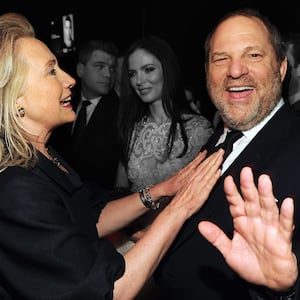Not even 30 minutes into the first episode of the four-part Hulu docuseries Hillary—and amidst a widely-shared sense of Hillary fatigue as she has just announced a forthcoming podcast—I wondered: Who is this thing even for?
The series, directed by Nanette Burstein, includes talking-head testimony from the former presidential candidate herself, along with her campaign staff, husband and former president Bill Clinton, childhood friends, college classmates, sympathetic journalists, and a Republican ally for good measure. It posits Hillary as “a leader of the revolutionary feminist movement” and “radical,” as Newsweek journalist Joe Klein emphatically claims, with the evidence being a speech she gave at Wellesley graduation, the undercover work she did for the Children’s Defense Fund, and a vaguely imperialist speech she gave at the U.N. women’s conference in Beijing. (I would argue while all of these involvements were reformist, they certainly don’t amount to anything like radicalism, which Hillary rejects anyway.)
Surely, liberal feminists, graduated from Yale Law and the like, may find affinity with this portrayal of Hillary as a pragmatic boss-feminist who has loved her problematic husband through thick and thin. But the fact is that Hillary, the documentary and the person, paint a victim narrative for an incredibly powerful woman who has ridden her middle-class background to academic pedigree to professional legitimacy and all the way to competing for the highest office in the land (as well as a net worth in the tens of millions). I say this as a graduate of Yale College myself, who has worked at one of the most highbrow magazines in the country (and has a negative net worth in the tens of thousands): Neither I nor Hillary are in any position to be leaders of a truly feminist revolution; the point is to be useful, to be in solidarity with the working-class women who should lead and have led it.
But as the documentary makes clear, Hillary isn’t listening—she did plenty of that when she and her husband each ran for office; now, we must listen to her. As a moderate Democrat who naturally believes in incrementalism (though the GOP’s called her a radical and a socialist, since that is an insult in their shared world), Hillary has actively forgone solidarity with working-class women of all cultural, ethnic, and racial backgrounds, in order to “get things done” with wealthy lawmakers. The documentary allows Hillary and her allies to list those pragmatic solutions, like the Children’s Health Insurance Program (CHIP), a kind of Medicaid for children under 19. CHIP is administered on the state level, and there are premiums as low as $45 per child or as high as $383.06 per child if household income exceeds the poverty line. For instance, if you have two kids, and earn more than $53,098.01 a year in the state of Pennsylvania, you will owe $766.12 per month for CHIP healthcare. Families who must pay premiums for CHIP will also have out-of-pocket costs like copays and coinsurance.
Like Obama’s Affordable Care Act, these kinds of means-tested reforms, passed with bipartisan support and thus with watered-down provisions that mean poor and struggling working-class families often still cannot afford the benefits, are the bread and butter of the policy wonkishness Hillary prides herself on. Never mind that, as the documentary is at least willing to admit, Bill Clinton’s administration may have been able to sign a universal health care bill if the former president hadn’t appointed his own wife to head up the committee.
We’re asked instead to focus on the undeniable sexism Hillary was met with as the head of this committee—Republicans used Hillary’s gender to dismiss and malign her, even though she was otherwise chummy with them. Yes, the Republicans deployed sexism as a political strategy to neutralize a popular demand (universal health care) in order to please the corporate lobbyists who bankroll them. But even Hillary later admits that, gender aside, she shouldn’t have been the one to head up that committee—as a first lady, who wasn’t elected, she should’ve been a champion for the cause and not a leader of it. Sound familiar?
Hillary is a four-part series about how a well-intentioned second-wave white feminist savior and former New York senator was denied the presidency via Electoral College because misogyny is still a thing. I imagine, then, that Hillary is for the women whose major concern is losing out on the most high-powered jobs because white men won’t let them in the most exclusive section of the club. (It’s also, as I’m sure Hillary would point out, for the fathers raising their daughters to have such ambitions.)
Here’s a challenge for that audience: Imagine a world in which power isn’t about corporate positions, organizational hierarchy, or the benevolent rich conferring a set of (contingent) benefits to the poor. Instead, imagine power as rooted in the right to live in a safe and sturdy home, the ability to get the healthcare you need without incurring costs, and the universal assurance of getting a good education debt-free. Under either set of metrics, Hillary and her ilk are still very much on top.







